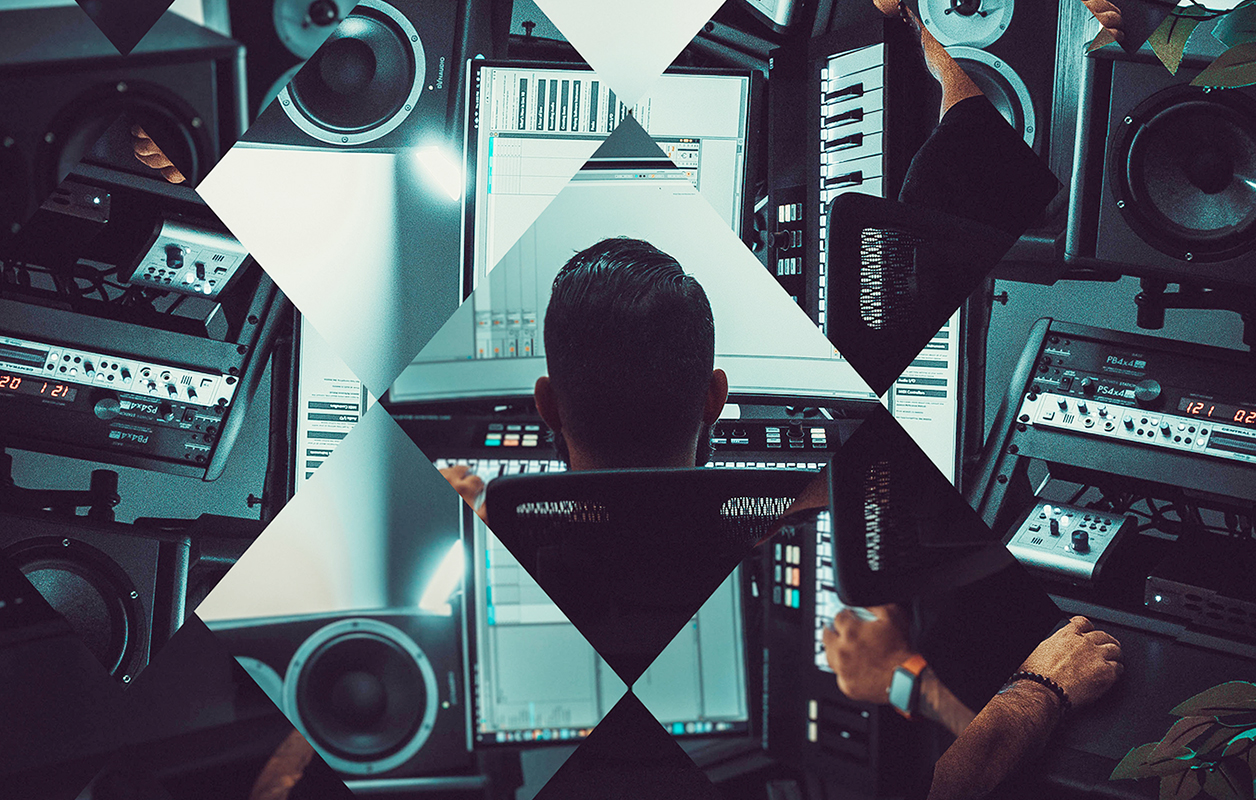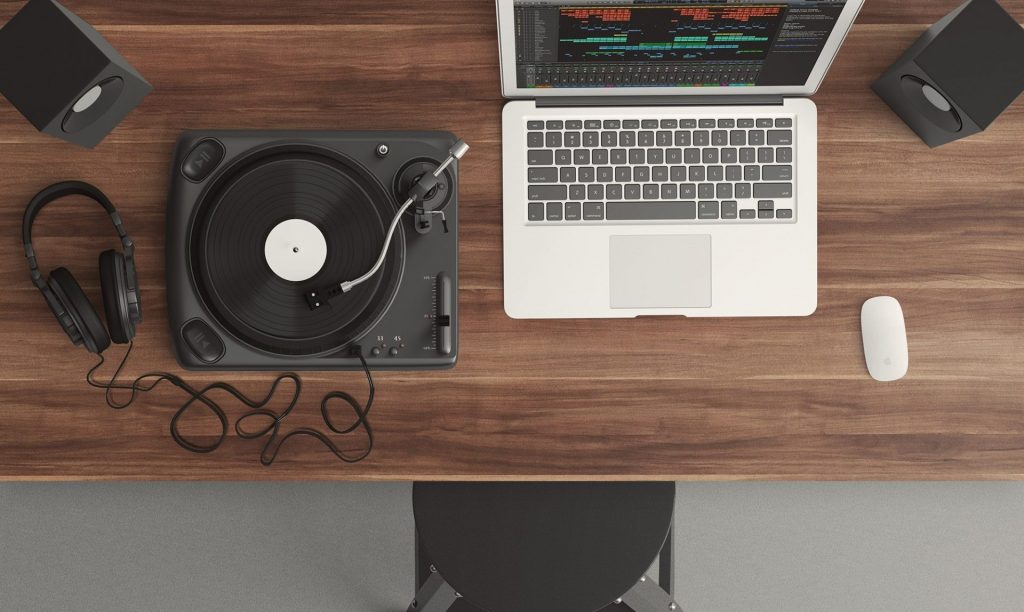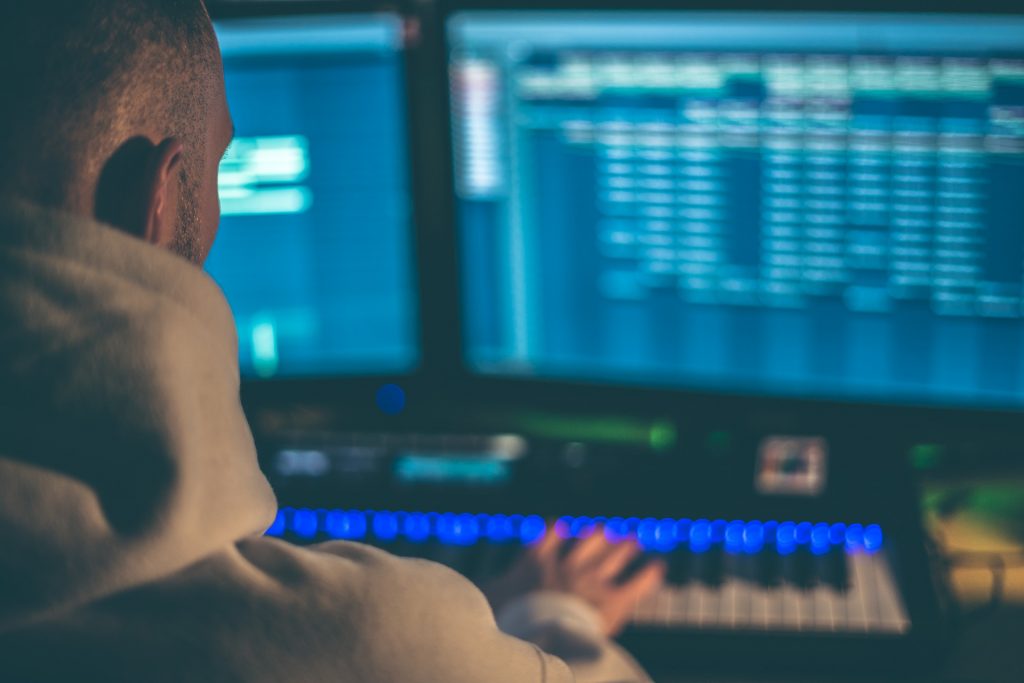
There’s no shortage of music production advice online. However, it can be difficult to sift fact from fiction when so many producers are opting to make music entirely from home, relying solely on guidance gleaned from the internet.
Below, we’ll debunk some of the most common misconceptions about music production so that you can produce quality beats without playing to these pitfalls.

1. You can only work when you feel inspired.
This is one of the biggest myths of music production and making music in general. While it’s true that some of the best songs are the result of a flash of inspiration, many others take time, multiple versions, and hours of tedious work to earn their earworm-worthy status.
Think of it this way: signed artists and producers are churning out multiple songs per week, only to select the best tracks for professional release. There’s no way a single artist can sustain constant creative inspiration. However, if you prioritize consistent practice, you may find that those creative “sparks” come more often.
One of the most important skills to develop as a music producer is learning how to work through writer’s block. Prioritize consistency to grow as a musician.
2. You need to be talented to learn how to produce.
While some people may be more musically inclined than others, it’s important to remember that anyone can learn to produce music. Just like any other skill, music production can be learned if practiced consistently.
If you’re not sure where to start, you can always seek out free tutorials via YouTube or social media. Anyone can produce as long as they have a DAW and find other supportive musicians in their community or online.
3. Music producers should all play an instrument.
As a producer, you’re told time and time again that being a producer doesn’t make you a “real” musician. This is simply false – your DAW is an instrument in itself. Don’t let naysayers discourage you from enjoying your craft. Production is unlike other fields of music since you’re challenged to learn a wide array of skills to make an entire song. Understanding how to play an instrument can be helpful, but it’s certainly not a prerequisite for being a successful producer.
4. You need expensive plugins to be successful.
There’s no denying that a quality plugin can make your job as a producer easier and improve your workflow. That being said, there’s nothing you need to make music other than your DAW and the stock plugins that come with it.
You can easily get into a gear trap feeling like you constantly need the newest equipment to compete with others. While great gear can be helpful, ultimately the greatest growth asset is you. Focus on spending time improving your craft with what you already have so that you have money to invest in a couple of select plugins or pieces.
5. A good song will speak for itself.
Not every producer wants their beats heard by others, but many of us do. While great music should always be the foundation of your artist strategy, know that it doesn’t always speak for itself. After releasing your song as an independent producer, you’ll still have to put in time, effort, and energy into music marketing and promotion for it to be heard.
6. Using samples is cheating.
So many of music’s greatest acts like Kanye West, Tyler, the Creator, Rihanna, Britney Spears (the list goes on) were built using samples. Anyone who tells you that using samples is cheating simply hasn’t taken the time to use them in their productions.
It still takes a ton of creativity and musicality to shape samples and place them within a new context that works. Continue to use loops and samples in your songs as you see fit, because the pros do too.
7. Some DAWs are better than others.
It’s not the DAW itself, but the producer behind the DAW, that makes all of the difference. Don’t let yourself get caught up in the needless debate surrounding DAWs. Instead, pick the one that makes the most sense for your particular workflow and stick with it.

8. Compression is key.
In many cases, compression can enhance tracks in a wide variety of ways. However, it shouldn’t be the end-all-be-all for any time you’re not sure how to enhance a track. Overcompressing a song can lead to a loss in dynamics, which gives your multitracks more of that organic, lively feel.
When it comes to any effect, compression or otherwise, ask yourself the purpose for your effect addition before placing it within your effect chain. There’s more than one way to accomplish the same production goal, so taking the time to consider the ‘why’ behind a plugin addition can help you use less and make for a more effective mix.
9. A great master can make up for poor mixing and production.
A great master starts with an excellent recording. Unfortunately, there’s no way to “fix” a song that’s been poorly produced. Remember that the process of music builds on itself, so it’s essential that you treat your song with care from recording to final master. Similarly, if you notice your song isn’t cutting it during, say the mixing process, it’s time to take a step back and re-record. Music can be tedious, but a polished track is well worth the extra effort.
10. Longer sessions encourage productivity.
Sometimes, you need to put in the midnight oil to finish up a track if you’re on a roll by yourself or a collaborator. But a lot of times, you don’t. In the world of music, longer doesn’t always mean better, which can be attributed to ear fatigue. We need healthy breaks from our creations in order to make informed decisions.
When possible, try to limit your recording sessions to only a couple of hours at a time. If you’re waffling between two major production decisions, sleep on it. Coming back with fresh ears the next day is going to make your choice a lot easier.
11. Always trust your ears.
Sound takes priority over any production “rules,” but that doesn’t mean that your ears alone are always the best judge when it comes to certain aspects of production. It can take years to train your ears properly, so you can’t rely on just your ears if you’re just starting out.
While everyone’s opinion is more or less subjective, there’s usually some truth to what’s common. If you get advice from five different musicians at different levels in their career and they all feel you need more instruments in the mid-frequency range, you probably do. Seeking out feedback has never been easier through online forums, social media, and Discord, so be sure to take the time to do so.
12. Additive EQ is always bad.
Like anything else in music production, there are almost no “always” or “never”s. Under the right circumstances, subtle additive EQ can help you highlight certain sections in your compositions without oversaturating the mix with unnecessary instruments.
The important thing to keep in mind is that any production or mixing technique used to the extreme is probably overcompensating for another issue. For instance, if you have to add more than three decibels of EQ boost to the high end of a vocal, it may just be better to re-record the track altogether. Use additive EQ to enhance an already amazing track, not cover up a mistake.
13. The louder the bass, the better.
It’s true that many of us prefer really “feeling” the bass. Many commercially produced headphones are developed with an extra bass boost since many listeners crave an enhanced low end. With that in mind, great producers know how to make a bass “breathe” without taking over the rest of the mix.
Your bass should be in balance with the rest of your tracks. It’s especially important not to oversaturate your song with bass, since the low-mid frequency range is notoriously difficult to clean up. If you know you tend to bring up the bass, try your best to seek out feedback from other engineers before bouncing out your final mix.
14. The artist is always right.
If you run sessions for other artists, there will be plenty of times where you have a difference of opinions. You’re ultimately there to serve the artist’s vision, but it’s also a good idea to share your insight if you feel like the artist is missing a critical opportunity. Worst case scenario, the artist rejects your idea.
When you’re running a session, you are just as much a consultant as you are the producer. Share your knowledge with artists but give them the final veto. Remember, your reputation is carried with everything you produce.
15. I’ve learned everything I can about music production.
As music producers, we are lifelong learners. Musicians can dedicate their lives to understanding the intricacies of a single synthesizer, so if you feel like you’ve learned everything you can about music production, you aren’t searching hard enough.
Keep pushing yourself to learn something new on a regular basis so that you can become a stronger, more-well rounded musician.

